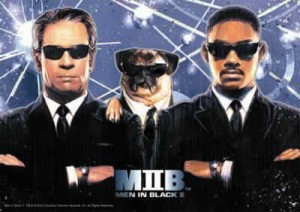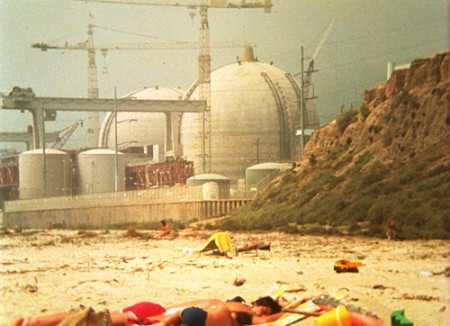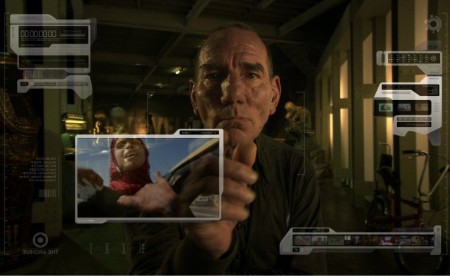2010-05-03
Science of Imagination (in Ludwig Musem) (part 2 / 4)
SCI-FI promenade at the other end of time ...
Ludwig Museum's new exhibition "Science of Imagination" is not only based on a theme but it's actually this theme that is being shown, this thought and all that it means including the whole era of Science-Fiction and so it as much as becomes an expression, a non-verbal 3-D multi-media essay, a complex installation ...
a cikk fejezetei:
::::: the mission of Sci-Fi
It's an exaggeration however to talk about deceivedness, letdown and the dropped away sci-fi land of promises. Since sci-fi future often involved burning of the world future beyond sci-fi future has nothing to do with decadence, we survived. Although sci-fi comes from before, see Jules Verne or think of Leonardo da Vinci, it became in the col war era what we take it for even today. World's burning, the destructive or self-destructive nature of men had been a basic motif (not only The Fifth Element (1997) but even Age of Stupid of last year kept to this tradition).
burning of the world future beyond sci-fi future has nothing to do with decadence, we survived. Although sci-fi comes from before, see Jules Verne or think of Leonardo da Vinci, it became in the col war era what we take it for even today. World's burning, the destructive or self-destructive nature of men had been a basic motif (not only The Fifth Element (1997) but even Age of Stupid of last year kept to this tradition).
But who would call destructive human nature overreacted by sci-fi writers after the Holocaust (that's what Leeloo is shocked by) or in an era where the destructive arsenal was growing at a much higher rate then men's control over it - see Cuban Missile Crisis which probably ended because Khrushchev must have been aware that even a drunk soviet officer in Cuba could start the nuclear war, because he didn't have enough control over their own missiles.
Now this exhibition "takes place" some day after the big burn but in an other way, i.e. the world didn't burn, it's only the futuristic future that has melt away. Today both sci-fi and the future sci-fi was pointing to are simple past. Future-research, futurism now means a different thing. People still walk on the ground and no spaceships in the garage.
Sci-fi however is no failure, much rather it seems as a beautiful flower that came out from something ugly (the threat of global
 destruction), as a beautiful hypnosis that came from artists who wanted to stop what was going on in a wrong path. While in sci-fi stories human nature is destructive sci-fi itself actually helped mankind survive an era when we didn't have the sufficient control nor the sobriety over destructive powers. Si-fi served as an extra control that kept cold war cold all the time and got everybody involved in the great mission that is saving the world. Sci-fi was the good side of mankind which overcame the bad one. Sci-fi saved planet Earth. Hundreds of stories depicted intelligence, humanity, peace, peaceful evolution, respect for nature as the most admirable virtues while they looked down on destruction with the greatest disdain - which had its effect.
destruction), as a beautiful hypnosis that came from artists who wanted to stop what was going on in a wrong path. While in sci-fi stories human nature is destructive sci-fi itself actually helped mankind survive an era when we didn't have the sufficient control nor the sobriety over destructive powers. Si-fi served as an extra control that kept cold war cold all the time and got everybody involved in the great mission that is saving the world. Sci-fi was the good side of mankind which overcame the bad one. Sci-fi saved planet Earth. Hundreds of stories depicted intelligence, humanity, peace, peaceful evolution, respect for nature as the most admirable virtues while they looked down on destruction with the greatest disdain - which had its effect.
We collectively admired the perfect creatures as the heralds of the future and we kept breathing in the culture of the future, and of the higher level of conscience. Today it's obvious that it's been a "get to know yourself" - game (nosce te ipsum) the point in which is that one explores that self that s/he'd have become by the end of the road of exploration. Gabor Body who himself wrote a brilliant sci-fi story, the "Psychotechnicum" which involves a time-loop and "endless reflection" like the La Jetée once said in a similar context that "I am the dream of my life". Throughout the road of the get-to-know-yourself one 's dreaming of her/his future self, that's what's being developed. Sci-fi was something like this, we can say. We were exploring the future, zealous for UFO-s and strange creatures while we were actually developing ourselves as a picture in the darkroom. In the end it turns out that it's been us those mysterious strangers.
Sci-fi ever since Leonardo, thru 19th century and Verne and snce the 1960's has been pointing to a less and less far away future. Today sci-fi technically deals with our present which is only as much separated from our future as Achilles from the turtle: one phase, one step.
The day After Tomorrow (2004) rocked the world with the theory about the Golf-current and with that enormous crack when the giant iceberg broke off - which by the time of the movie's coming out became reality. There's Franny Armstrong's Age of Stupid from last year which is totally taking place in our present, however formally it operates with a sci-fi frame setting our present as the past viewed from the dark future when we're already past, only files in an archive from the age when we still "could have saved" our planet.
Although sci-fi future now happens to be very close to the present sci-fi still works in the traditional way as it always has (think of greatest movie success of 2010, The Avatar which depicts respect for nature and the living and disdain for destruction in the most powerful way ever in 3D).
We can say sci-fi has retained its future-exploring (pre-experience maker, decision-helper, effect-stud maker) intellectual activity. Still something has thoroughly changed, our relation to modern and modernity.
Sci-fi becme what it is at the climax of the modern age, but also sci-fi has been exploring the modern ever since Leonardo, searching for the futuristic, the future brand new, the future itself. Sci-fi has been the catalyst for the development of modern civilization, a catalyst, a guard, a guide, a herald and promoter too. Thru all those phases of time and history sci-fi projected the future, thousands of possible versions of it, all of them radiating with the respect for life and nature, disdain for destruction and humanity's supremacy over technical evolution.

Sci-fi hasn't just been a funny fashion which by now became outdated, it's rather been an alternative channel of vital importance, a medium by which society otherwise prone to centralized mass media could stay under the benevolent influence of positive reason.
Sci-fi is no news of yesterday, what became outdated is only modern, the age of modern and modernity. End of modern was already obvious by the beginning of the 80's, Godfrey Reggio's film Koyaanisqatsi (1982) is already a huge warning indicating that technical evolution as it had been going on ever since Industrial Revolution is headed to a catastrophe, and the whole path is wrong.
It's actually amazing that although sci-fi was originally and traditionally obsessed with technics and evolution after a certain point it came off this orbit of modern and started to focus on survival, humanity, survival of humanity instead. This change however didn't happen in just a moment's time. Even as early as 1957 there was a sci-fi story about a robot sent back from the future to save the planet (Soldier from Tomorrow by Harlan Ellison whose sci-fi tv-films directly inspired the Terminator 1.)
The Day After from 1983 is quite a significant tv-movie showing explicitly what happens during nuclear war. "Nothing special" but the nuclear war, it wasn't even a real film but an illustrative educational, a spectacular demonstration - but it got to hundreds of millions worldwide and by its persuasive powers it modified our conscience in favour of defending life in an age in which Reagan invaded Granada only on the basis of the advice that a conflict modelling computer program gave them, and started a star war program.
Postmodern (which you couldn't exactly tell) was a great turn throughout which we collectively begin to see what modern, modernity and the modern evolution had been about and that this all was a wrong path. Terminator 1. as a cult sci-fi in 1984 was a simple time-travelling action-movie whereas Terminator 2. in 1991 was already a revolution, turning against the technical evolution stating that we became slaves of this evolution that we used to be masters of.
M. Night Shyamalan's Happening from 2008 is an explicit environmentalist warning, indicating that survival of Earth and nature became conflicting with survival of mankind. It is especially remarkable in this film that the threat and horror is represented by green plants, those that originally
 we're the most attracted to. Analogous to this is a music video seen by hundreds of millions worldwide thru MTV in 2004, a work by Uwe Flade for Depeche Mode's Enjoy the Silence (Linkin Park remix) in which it's a plant that causes the entire system to collapse, a horror story in which mankind is the bad guy.
we're the most attracted to. Analogous to this is a music video seen by hundreds of millions worldwide thru MTV in 2004, a work by Uwe Flade for Depeche Mode's Enjoy the Silence (Linkin Park remix) in which it's a plant that causes the entire system to collapse, a horror story in which mankind is the bad guy.
Postmodern by definition and by its function must last (have lasted) as long as we can already see the new era. Before it was much easier to recognize a new era since they all were like new models of the same product line, like new cars from the same factory. Postmodern was different however since this time we we left the original line and changed for a new one, according to the example the new model is not even a car car already but something totally different, a bicycle (and it's no more manufactured by the same old company either, and even manufacturing means a different thing, something opensource and non-profit).
This new era is about something totally different from which now we can already only see that it's practically the opposite to modern, it's non-modern. This opposition emerges along the problem "mankind vs. environment". While up to now spreading was the main preference (to the detriment of environment) now it's already sustainability (in favour of environment). While so far comfort, luxury, overriding of natural circumstances (heated terraces in winter, ice cubes in summer, air-conditioner) was prevailing and a greed for pleasures now it's getting to be ergonomy, evaluating life, drinking water and healthy life-style - this latter also as opposite to being fat.
There's a thousand frontiers but it's the same big GREEN turn, and the beauty of it is that what nature and survival makes us do is actually good for us, it results in a way healthier, happier, more enjoyable and more profound life. That is an ergonomic lifestyle. We are like addiction patients for whom rehabilitation is not a necessary bad thing, not a restriction but a possible start of a way more reasonable human life. This turn brings good for everyone that is why we even stand a chance that this thought (and all the acts unfolding from it) is going to spread at a revolutionary pace.
One of the climaxes of our modern ages was definitely that moment when Bush Jr. verbalized that US wages war for American lifestyle. The mere opposite to this became Franny Armstrong's Age of Stupid which makes it clear that it's exactly our lifestyle that we have to fight. Nevertheless Age of Stupid and COP 13 can be taken as the zero moment of the GREEN turn - by which we entered the age of non-modern.
Franny Armstrong's film and the 2009 Climate Summit also shed light on the greatest gift of this period, that is the power and human initiatives and civil organizations, and that man is no longer a tv-viewer who gets out to vote in every 4 years or so and then goes back to his cell again to keep watching, now it's the people down there who should tell what is going to happen at the high level of collective decision making, politics. This is the age of Facebook when society no longer consists of consumers living in their cells plugged onto central mass media but of people who can share and spread thoughts horizontally, organize, develop thoughts and make them happen. Today these movements and all initiatives coming from ground level, all the horizontal organizations play the same intellectual guarding role that sci-fi has been playing so far.

Age of sci-fi however is not over yet, but instead it's having a renaissance, the only thing that's different is that this is no longer the cold war sci-fi, the enemy is no longer the Russians. China is the new friend so we ran out of enemies (it's interesting to look at the series of enemies in the James Bond movies, the one before the last it was North-Korea but in the last one - it's hard to remember). No more enemies - thank god! In the Avatar the enemy is already mankind (and also the survivors are not humans).
The result is the new sci-fi, sci-fi after the GREEN turn, sci-fi without modernity, sci-fi in the non-modern spirit.
következő fejezet: Science of Imagination
a cikk fejezetei:
-Pilot Pirx-
2010-05-03


